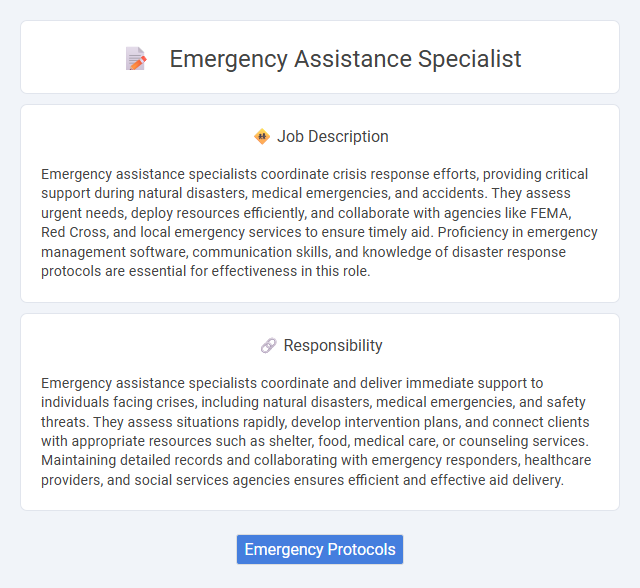
Emergency assistance specialists coordinate crisis response efforts, providing critical support during natural disasters, medical emergencies, and accidents. They assess urgent needs, deploy resources efficiently, and collaborate with agencies like FEMA, Red Cross, and local emergency services to ensure timely aid. Proficiency in emergency management software, communication skills, and knowledge of disaster response protocols are essential for effectiveness in this role.
Individuals with a strong capacity for empathy and resilience are likely to be suitable for an Emergency Assistance Specialist role, as it frequently involves supporting people in highly stressful and traumatic situations. Those who can maintain composure under pressure and communicate effectively may have a higher probability of succeeding in this job. However, people who struggle with emotional stress or have difficulty adapting to unpredictable environments might find the demands of this position challenging.
Qualification
Emergency assistance specialists require strong qualifications including a degree in emergency management, public safety, or a related field; certification in first aid, CPR, and crisis intervention; and experience in disaster response or humanitarian aid. Proficiency in using emergency communication systems and knowledge of local, state, and federal emergency protocols are essential. Strong problem-solving skills, ability to work under pressure, and excellent interpersonal communication are critical for effective coordination during emergencies.
Responsibility
Emergency assistance specialists coordinate and deliver immediate support to individuals facing crises, including natural disasters, medical emergencies, and safety threats. They assess situations rapidly, develop intervention plans, and connect clients with appropriate resources such as shelter, food, medical care, or counseling services. Maintaining detailed records and collaborating with emergency responders, healthcare providers, and social services agencies ensures efficient and effective aid delivery.
Benefit
Emergency assistance specialists likely benefit from a rewarding career that offers the opportunity to provide critical support during crises. They probably experience strong job stability due to the ongoing demand for emergency response services. Competitive compensation and benefits packages are also common, enhancing overall job satisfaction.
Challenge
Emergency assistance specialists likely face the challenge of managing high-pressure situations where quick decision-making is crucial. The unpredictable nature of emergencies may require adaptability to rapidly changing circumstances and prioritizing resources effectively. Balancing empathy with efficiency could also present a complex challenge in delivering timely support while addressing individuals' emotional needs.
Career Advancement
Emergency assistance specialists develop critical skills in crisis management, disaster response, and resource coordination that position them for rapid career advancement within public safety and emergency management sectors. Mastery of emergency protocols, data analysis, and communication systems enhances eligibility for supervisory roles or specialized fields such as emergency preparedness planning and disaster recovery operations. Continued education and certification in emergency management certifications like FEMA's Professional Development Series accelerate promotion opportunities and leadership responsibilities.
Key Terms
Emergency Protocols
Emergency assistance specialists expertly implement emergency protocols to ensure rapid, efficient response during crises, minimizing risks to human life and property. Their deep knowledge of evacuation procedures, communication systems, and resource allocation enables seamless coordination among first responders and aid organizations. Mastery of regulatory compliance and real-time situational assessment is critical for optimizing emergency outcomes and maintaining public safety.
 kuljobs.com
kuljobs.com